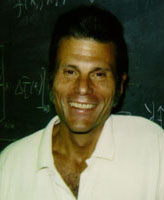The Second IASTED International Conference on
Environmental Modelling and Simulation
EMS 2006
November 29 – December 1, 2006
St. Thomas, US Virgin Islands
KEYNOTE SPEAKER
Human-Induced Climate Change:
From Quantum Mechanics to Climate Policy
Abstract
Objectives
Timeline
Tutorial Materials
Target Audience
Background Knowledge Expected of the Participants
Biography of the Keynote Speaker

Michael E. Schlesinger, Professor of Atmospheric Sciences, University of Illinois at Urbana-Champaign (UIUC), received his B.S. and M.S. degrees in Engineering, and his Ph.D. degree in Meteorology, all from the University of California, Los Angeles. Professor Schlesinger directs the UIUC Climate Research Group (CRG) within the Department of Atmospheric Sciences. In 1996 he published the first simulation of the onset of the last ice age using a coupled atmospheric general circulation/mixed-layer ocean-ice-sheet/asthenosphere model. In 1997 he developed the Country-Specific Model for Intertemporal Climate that has been used by 123 scientists in 47 countries. Since 1991 he has published several papers on climate-change impacts and policy, including those developing the robust adaptive decision strategy. He has published papers on the influence of the Pinatubo eruption on climate and chemistry, on the causes of the observed temperature changes since 1856, and on an objective estimation of the probability distribution for climate sensitivity based on observed temperature changes. His research currently focuses on: (1) Simulating and understanding the past, present and possible future behavior of the Atlantic thermohaline circulation; (2) Characterizing and reducing the uncertainty in the estimated climate sensitivity; (3) Determining the effects on past and future climate of the sun, sulfate aerosols (both of volcanic and anthropogenic origin), and natural variability; (4) Performing integrative assessment of climate change, including the impacts of climate change and adaptation and mitigation responses; (5) Further developing the robust adaptive decision strategy; and (6) Simulating and understanding the coupled climate-chemistry system, including the influences of the sun (both irradiance and energetic electron precipitation) and volcanoes. Prof. Schlesinger has directed NATO and other conferences in Italy, England, and the United States; has edited three books; and has contributed to many assessments of climate change, including those of the IPCC and the Energy Modeling Forum. He is has just completed editing the book Human-Induced Climate Change: An Interdisciplinary Assessment to be published by Cambridge University Press.
References
| [1] |











